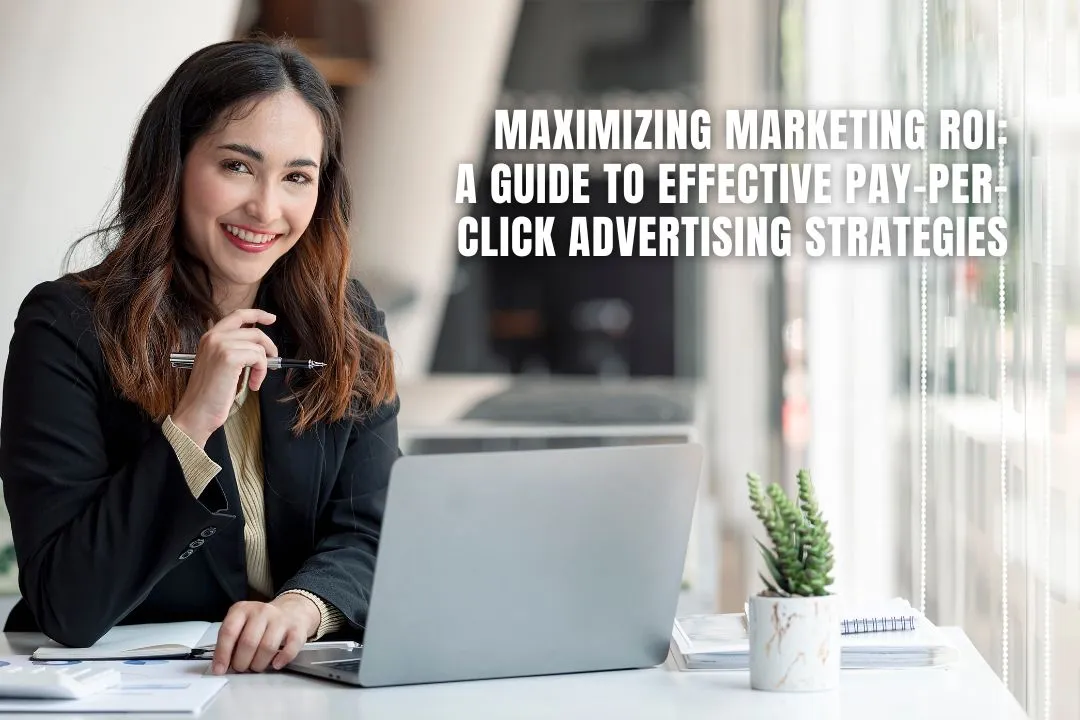Maximizing Marketing ROI: A Guide to Effective Pay-Per-Click Advertising Strategies
November 11, 2024

Pay-per-click (PPC) advertising is a key strategy in digital marketing that helps businesses reach their audience effectively. This guide will walk you through the essential steps to maximize your marketing return on investment (ROI) using PPC. By understanding the basics, conducting thorough keyword research, crafting engaging ad copy, optimizing landing pages, managing budgets, analyzing campaigns, and staying updated with industry trends, you'll be better equipped to make your PPC efforts successful. Let's explore how to use pay-per-click advertising to its fullest potential!
Key Takeaways on Effective PPC Strategies
- Grasping PPC Basics: PPC advertising is a paid model where businesses pay for each click, helping reach audiences quickly and effectively through targeted online ads.
- Effective Keyword Research: Choosing the right keywords ensures ads reach the intended audience, enhances relevance, and balances cost-efficiency, driving better campaign results.
- Crafting Engaging Ad Copy: A strong ad copy should highlight benefits, include clear calls-to-action, and incorporate keywords to increase clicks and conversions.
- Optimizing Landing Pages: Well-aligned, fast-loading landing pages enhance user experience and conversion rates, making them a crucial component of PPC success.
- Managing Budgets and Bids Wisely: Setting realistic budgets and using bidding strategies helps maximize ROI and avoid overspending on low-value clicks.
- Analyzing Campaign Performance: Tracking KPIs like CTR, CPC, and conversion rates allows for data-driven decisions, helping to continuously optimize campaigns.
- Staying Updated on PPC Trends: Regularly learning about industry trends and adopting new strategies keeps campaigns relevant, competitive, and effective in a fast-evolving landscape.
Register Your LLC
Company Registration
START NOWUnderstanding the Basics of Pay-Per-Click Advertising
What is Pay-Per-Click Advertising?
Pay-Per-Click (PPC) advertising is a method of online marketing where advertisers pay a fee each time someone clicks on their ad. In simple terms, it’s a way to buy visits to your website instead of trying to earn them organically. This model allows businesses to reach their target audience effectively.
Key Components of a PPC Campaign
A successful PPC campaign consists of several key elements:
- Keywords: The terms that users search for, which trigger your ads.
- Ad Copy: The text that appears in your ads, designed to attract clicks.
- Landing Pages: The web pages users land on after clicking your ad, which should be relevant and engaging.
- Bidding Strategy: The method used to determine how much you are willing to pay for each click.
Benefits of Using PPC Advertising
PPC advertising offers numerous advantages:
- Immediate Results: Unlike organic methods, PPC can generate traffic quickly.
- Targeted Reach: You can target specific demographics, locations, and interests.
- Measurable ROI: You can track the performance of your ads and adjust strategies accordingly.
PPC advertising is a powerful tool that can help businesses connect with potential customers effectively. Understanding its basics is crucial for maximizing your marketing efforts.
Conducting Effective Keyword Research
Importance of Keyword Research in PPC
Keyword research is a crucial step in maximizing your PPC success. It helps you find the right words that potential customers use when searching for your products or services. Here are some key reasons why keyword research is important:
- Relevance: Using the right keywords ensures your ads reach users who are genuinely interested in what you offer.
- Cost-Effectiveness: Finding a balance between competition and search volume can lead to lower costs per click (CPC).
- Ad Placement: The keywords you choose directly affect where your ads appear in search results.
Tools for Finding High-Performing Keywords
To conduct effective keyword research, you can use various tools. Here are some popular options:
- Google’s Keyword Planner: A free tool that provides insights into search volume and competition.
- SEMrush: A comprehensive tool that offers keyword suggestions and competitor analysis.
- Ahrefs: Great for finding related keywords and understanding search intent.
Long-Tail Keywords and Their Advantages
Long-tail keywords are longer, more specific phrases that often have less competition. Here are some advantages of using them:
- Higher Conversion Rates: They usually attract users who are further along in the buying process.
- Lower Competition: Less competition means you can often achieve better ad placements at a lower cost.
- Better Targeting: They help you reach a more specific audience, increasing the chances of conversion.
In summary, effective keyword research is like mining for gold in the PPC world. It helps you discover the right keywords that can lead to better ad performance and higher returns on your investment.
Crafting Compelling Ad Copy

Elements of a Persuasive Ad Copy
Creating effective ad copy is essential for attracting clicks and driving conversions. Here are some key elements to consider:
- Focus on Benefits: Clearly state what users will gain by clicking your ad.
- Strong Calls-to-Action (CTAs): Use phrases like "Get Started Now" or "Claim Your Offer" to guide users on what to do next.
- Incorporate Keywords: Use relevant keywords to improve ad relevance and connect with your audience's search intent.
Testing and Optimizing Ad Variations
To find the best-performing ad copy, it’s important to test different variations. Here’s how:
- A/B Testing: Create two versions of your ad and see which one performs better.
- Analyze Results: Look at metrics like click-through rates and conversions to determine success.
- Iterate: Use the insights gained to refine your ad copy further.
Using Calls-to-Action Effectively
A strong call-to-action can significantly impact your ad's performance. Here are some tips:
- Be Clear: Make sure your CTA is easy to understand.
- Create Urgency: Phrases like "Limited Time Offer" can encourage immediate action.
- Positioning: Place your CTA prominently in your ad to catch attention.
Crafting compelling ad copy is not just about being creative; it’s about being strategic. Effective ad copy can lead to higher engagement and conversions, making it a crucial part of your PPC strategy.
Optimizing Landing Pages for Better Conversions
Driving traffic to your site is only half the battle; the other half is converting that traffic. A well-optimized landing page is essential for turning clicks into conversions.
Aligning Landing Pages with Ad Copy
- Ensure that your landing page matches the message in your ad. A disconnect can cause users to leave quickly.
- Use clear and compelling calls-to-action (CTAs) to guide users on what to do next.
- Make sure the design and content are visually appealing and easy to understand.
Improving User Experience on Landing Pages
- Speed Matters: Slow-loading pages can lead to lost conversions. Aim for fast load times, especially on mobile devices.
- Optimize for mobile: Many users will access your site via mobile, so responsive design is crucial.
- Simplify forms: If your goal is lead generation, use short and simple forms to avoid overwhelming potential leads.
Mobile Optimization and Fast Loading Speeds
- Test your landing pages on various devices to ensure they look good and function well everywhere.
- Use tools to analyze loading speeds and identify areas for improvement.
- Regularly update your landing pages to keep them fresh and relevant.
A well-optimized landing page can significantly boost your conversion rates, making it a vital part of your PPC strategy.
By focusing on these key areas, you can enhance the effectiveness of your landing pages and maximize your marketing ROI.
Managing Budgets and Bids Efficiently
Managing your budget and bids is essential for getting the most out of your Pay-Per-Click (PPC) advertising. Overspending on unimportant clicks can hurt your campaign's success. Here are some key strategies to help you manage your PPC budget and bids effectively:
Setting a Realistic PPC Budget
- Define Your Marketing Objectives: Start by understanding what you want to achieve with your PPC campaign. This could be generating leads, making sales, or increasing brand awareness.
- Analyze Historical Data: Look at past performance to see what worked and what didn’t. This will help you set a budget that makes sense.
- Understand Your Audience and Market: Knowing your audience helps you allocate your budget where it will be most effective.
- Consider Seasonality: Some products or services may perform better at certain times of the year, so adjust your budget accordingly.
Understanding Bidding Strategies
Using Automated Bidding Tools
- Target CPA (Cost Per Acquisition): This strategy aims to get as many conversions as possible at a set cost.
- Target ROAS (Return on Ad Spend): Focuses on maximizing revenue based on your ad spend.
- Maximize Conversions: Automatically sets bids to get the most conversions within your budget.
Managing your PPC budget and bids wisely can lead to better results and a higher return on investment. Always keep an eye on your performance and adjust as needed!
Analyzing and Adapting PPC Campaigns

Tracking Key Performance Indicators
To ensure your PPC campaigns are effective, it’s crucial to track key performance indicators (KPIs). Monitoring these metrics helps you make data-driven decisions. Here are some important KPIs to consider:
- Click-Through Rate (CTR)
- Conversion Rate
- Cost Per Click (CPC)
Making Data-Driven Decisions
Using the data collected from your campaigns, you can make informed choices. For example:
- Adjust budgets based on keyword performance. If a keyword is underperforming, consider reallocating funds.
- Optimize bids for high-performing keywords to maximize their impact.
- Analyze ad schedules to find the best times to show your ads.
Continuous Campaign Improvement
Improving your campaigns is an ongoing process. Here are some strategies:
- A/B Testing: Regularly test different ad copies and landing pages to see what works best.
- Remarketing: Re-engage users who visited your site but didn’t convert. This can significantly boost your chances of conversion.
- Stay Updated: The digital marketing world changes quickly. Keep learning about new trends and strategies to stay ahead.
Staying informed about emerging marketing trends is essential for adapting your PPC strategies effectively.
Summary Table of Key Metrics
Staying Updated with Industry Trends
In the fast-changing world of pay-per-click (PPC) advertising, keeping up with the latest trends is essential for success. Here are some key areas to focus on:
Importance of Keeping Up with PPC Trends
- Stay competitive: Understanding new trends helps you stay ahead of your competitors.
- Adapt strategies: New tools and techniques can improve your campaigns.
- Maximize ROI: By using the latest strategies, you can get the most out of your advertising budget.
Resources for PPC Industry Updates
- Industry blogs: Follow top PPC blogs for insights and updates.
- Webinars: Attend online seminars to learn from experts.
- Conferences: Participate in industry events to network and gain knowledge.
Networking with PPC Professionals
- Join online communities: Engage with other PPC professionals to share ideas and strategies.
- Collaborate: Work with others to learn new techniques and tools.
- Mentorship: Seek guidance from experienced professionals in the field.
Staying informed about PPC trends, such as the rise of AI-powered tools and changes in data privacy, is crucial for adapting your strategies effectively.
By focusing on these areas, you can ensure that your PPC campaigns remain effective and profitable in an ever-evolving digital landscape.
Conclusion
To succeed in PPC advertising, you need a smart plan that covers all parts of your campaign. This means having clear goals, managing your budget wisely, and writing ads that grab attention. Each of these elements is important for making your campaign work well. It's also vital to keep an eye on how your ads are doing and make changes as needed. As you grow, stay updated on what’s happening in the industry to keep your strategies fresh and effective. With the tips and ideas shared in this guide, you’re ready to start your PPC journey. Focus on getting the best return on your investment and watch your business thrive in the digital world.
Frequently Asked Questions
What is pay-per-click advertising?
Pay-per-click (PPC) advertising is a way for businesses to get their ads shown online. They pay a fee each time someone clicks on their ad.
How can I find good keywords for my PPC campaigns?
To find effective keywords, use tools like Google Keyword Planner. Look for words and phrases that people are searching for that relate to your business.
What makes ad copy effective?
Good ad copy grabs attention and makes people want to click. It should clearly explain what you offer and include a strong call to action.
Why is it important to optimize landing pages?
Optimizing landing pages helps ensure that visitors have a good experience. If your landing page matches the ad and loads quickly, visitors are more likely to stay and take action.
What are some tips for managing my PPC budget?
Set a clear budget before starting your campaign. Keep track of your spending and adjust your bids based on what’s working and what’s not.
How can I improve my PPC campaigns over time?
Regularly check your campaign data to see what’s working. Make changes based on this data and keep testing new strategies to improve your results.

